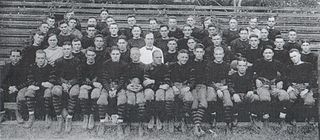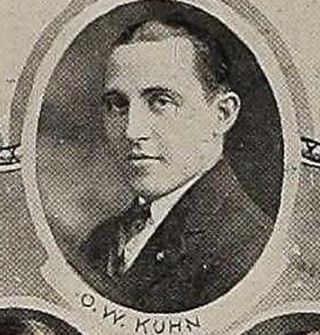
The Nashville Seraphs, often known as the Nashvilles, were a minor league baseball team that played in the Class B Southern League in 1895. They were located in Nashville, Tennessee, and played their home games at Athletic Park, later known as Sulphur Dell. The club won the Southern League pennant in their only season, becoming the city's first minor league baseball team to win a league championship.
The 1902 Tennessee Volunteers football team represented the University of Tennessee in the 1902 Southern Intercollegiate Athletic Association football season. The Volunteers won a school record six games in 1902 and beat rivals Sewanee and Georgia Tech. The team was guided by a new head coach, Hubert Fisher, who came from Princeton University, as did his predecessor, George Kelley.

The 1897 Vanderbilt Commodores football team represent Vanderbilt University during the 1897 Southern Intercollegiate Athletic Association football season. Vanderbilt was in its eighth season of playing football; coached by R. G. Acton. The Commodores finished the season without being scored on. Vanderbilt played in the Southern Intercollegiate Athletic Association (SIAA) and won the SIAA Championship, the first claimed in school history.

The 1922 Vanderbilt Commodores football team represented Vanderbilt University during the 1922 Southern Conference football season. During the season, Dan McGugin's 18th as head coach, Vanderbilt compiled a record of 8–0–1 and outscored its opponents 177 to 16. The Commodores' defense was unrivaled in the South, leading the nation in giving up just 1.8 points per game, none of them at home. The season included a tie with Michigan at the dedication of the new Dudley Field; the first stadium in the South to be used exclusively for college football. The season was immediately dubbed one of the best in Vanderbilt and Southern football history.

The 1906 Vanderbilt Commodores football team represented Vanderbilt University during the 1906 Southern Intercollegiate Athletic Association football season. The team's head coach was Dan McGugin, who served his third season in that capacity. Members of the Southern Intercollegiate Athletic Association (SIAA), the Commodores played seven home games in Nashville, Tennessee at Curry Field, and finished the season with a record of 8–1 overall and 5–0 in SIAA.
The 1907 Vanderbilt Commodores football team represented Vanderbilt University during the 1907 Southern Intercollegiate Athletic Association football season. The team's head coach was Dan McGugin, who served his fourth season in that capacity. Members of the Southern Intercollegiate Athletic Association, the Commodores played five home games in Nashville, Tennessee and finished the season with a record 5–1–1 and 3–0 in SIAA.

The 1902 Vanderbilt Commodores football team represented Vanderbilt University during the 1902 Southern Intercollegiate Athletic Association football season. W. H. Watkins was in his second year coaching Vanderbilt. Vanderbilt was playing in its 13th season of football. The Commodores had wins over Cumberland, Ole Miss, Central of Kentucky, Tennessee, Washington University, Kentucky, Tulane and LSU. The Tulane and LSU contests were played with one day's rest between games for the Commodores.

The 1921 Vanderbilt Commodores football team was an American football team representing Vanderbilt University during the 1921 Southern Intercollegiate Athletic Association football season. It was Dan McGugin's 17th season as head coach, and Wallace Wade's first season as assistant coach. Vanderbilt outscored its opponents 161–21 for a record of 7–0–1 and a share of the Southern Intercollegiate Athletic Association (SIAA) championship. The team's leading scorer was halfback Rupert Smith and its captain was "Pink" Wade, father of future Vanderbilt star Bill Wade. The Commodores played their home games at Dudley Field.

The 1923 Vanderbilt Commodores football team represented Vanderbilt University in the sport of college football during the 1923 Southern Conference football season. The team's head coach was Dan McGugin, who served his 19th year in that capacity. The Commodores played six home games at Dudley Field in Nashville, Tennessee. Vanderbilt finished the season with a record of 5–2–1 overall and 3–0–1 in SoCon play, outscoring opponents 137–33. The team suffered its losses to the national champion Michigan Wolverines and the undefeated Texas Longhorns.

The 1920 Vanderbilt Commodores football team represented Vanderbilt University during the 1920 college football season. The team's head coach was Dan McGugin, who served his 16th season in that capacity. Members of the Southern Intercollegiate Athletic Association (SIAA), the Commodores played five home games in Nashville, Tennessee, and finished the season with a record 4–3–1 and 3–3 in the SIAA. The Commodores outscored their opponents, 134–124.

The 1924 Vanderbilt Commodores football team represented Vanderbilt University in the 1924 Southern Conference football season. The 1924 season was Dan McGugin's 20th year as head coach. Members of the Southern Conference, the Commodores played six home games in Nashville, Tennessee, at Dudley Field and finished the season with a record of 6–3–1. Vanderbilt outscored its opponents 150–53. Fred Russell's Fifty Years of Vanderbilt Football dubs it "the most eventful season in the history of Vanderbilt football."

The Sewanee–Vanderbilt football rivalry was an American college football rivalry between the Sewanee Tigers and Vanderbilt Commodores. They were both founding members of the Southern Intercollegiate Athletic Association (SIAA), the Southern Conference, and the Southeastern Conference (SEC). Both teams' histories feature some powerhouses of early Southern football, e.g. 1899 Sewanee Tigers football team and 1906 Vanderbilt Commodores football team. It was the oldest of Vanderbilt's rivalries; dating back to 1891 when Vanderbilt played its second ever football game and Sewanee played its first. Vanderbilt leads the series 40–8–4. It used to be claimed as the oldest rivalry in the south, older than the "South's Oldest Rivalry" between North Carolina and Virginia. Usually played towards the end of the season on Thanksgiving Day, the two teams have not met again since 1944.

Oliver Wall Kuhn, nicknamed "Doc Kuhn", was an American football, baseball and basketball player for the Vanderbilt University Commodores and later a prominent businessman of Tampa, Florida. As a college football quarterback, Kuhn led Vanderbilt to three consecutive Southern titles in 1921, 1922, and 1923 – the most-recent conference titles for Vanderbilt football. In 1922, Vanderbilt tied Michigan at the dedication of Dudley Field, and Kuhn was picked for Walter Camp's list of names worthy of mention and Billy Evans' All-America "National Honor Roll."
The 1910 Vanderbilt Commodores football team represented Vanderbilt University in the sport of American football during 1910 college football season. In Dan McGugin's 7th year as head coach, the Commodores as members of the Southern Intercollegiate Athletic Association (SIAA) compiled an 8–0–1 record and outscored their opponents 165 to 8, winning a conference championship.
The 1911 Vanderbilt Commodores football team represented Vanderbilt University in the 1911 college football season. It was Dan McGugin's 8th year as head coach. The team outscored its opponents 259 to 9, winning an undisputed Southern Intercollegiate Athletic Association (SIAA) title.

The 1912 Vanderbilt Commodores football team represented Vanderbilt University in the 1912 college football season. The 1912 season was Dan McGugin's ninth year as head coach. Members of the Southern Intercollegiate Athletic Association (SIAA), the Commodores won their third straight conference title this year, posting an 8–1–1 win–loss–tie record. The team played its home games at Dudley Field. It used the short punt formation as its offensive scheme.
The 1927 Vanderbilt Commodores football team represented Vanderbilt University in the 1927 Southern Conference football season. The 1927 season was Dan McGugin's 23rd year as head coach. Running back Jimmy Armistead led the nation in scoring in 1927 with 138 points. The team's quarterback was Bill Spears. One fellow wrote Vanderbilt produced "almost certainly the legit top Heisman candidate in Spears, if there had been a Heisman Trophy to award in 1927."

The 1913 Vanderbilt Commodores football team represented Vanderbilt University in the 1913 Southern Intercollegiate Athletic Association football season. The 1913 season was Dan McGugin's 10th year as head coach. Members of the Southern Intercollegiate Athletic Association, the Commodores played six home games in Nashville, Tennessee and finished the season with a record of 5–3 overall and 2–1 in conference play.

The 1906 Carlisle vs. Vanderbilt football game, played November 22, 1906, was a college football game between the Carlisle Indians and Vanderbilt Commodores. Vanderbilt defeated the northern school by a single, 17-yard Bob Blake field goal, Vanderbilt coach Dan McGugin described the win as "the crowning feat of the Southern Intercollegiate Athletic Association season." The 1906 Vanderbilt team had one of the greatest seasons in school history, once rated by Innis Brown as the best the South ever had.

The Georgia Tech–Vanderbilt football rivalry is an American college football rivalry between the Georgia Tech Yellow Jackets and Vanderbilt Commodores. Both universities are founding members of the Southeastern Conference (SEC) and Southern Conference (SoCon), and Southern Intercollegiate Athletic Association (SIAA). Georgia Tech leads the series all time 20–15–3.















